We’ve come a long way since Oct. 25, 1969, when 19 directors of community mental health centers met in Denver to explore the creation of a formal organization.
Explore Our History!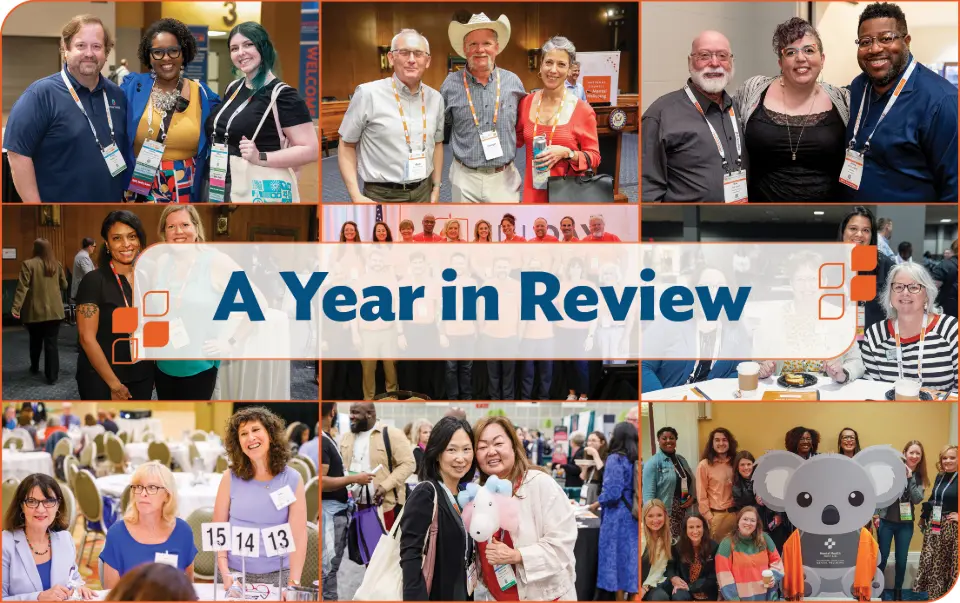
On behalf of more than 3,200 member organizations nationwide, the National Council for Mental Wellbeing made significant strides in 2024, taking bold steps to strengthen, better fund and seamlessly integrate mental health and substance use care across the country. This annual report highlights our key achievements and emphasizes the critical work we are doing to ensure mental wellbeing — including recovery from substance use — is a reality for everyone, everywhere.
A Message from Chuck Ingoglia, President & CEO
“The work outlined in this snapshot is informed by our hardworking members and guided by our diligent board of directors. I’m so grateful for the work we achieved this year.”
A Year in Review
Advancing Care Through Advocacy and Policy
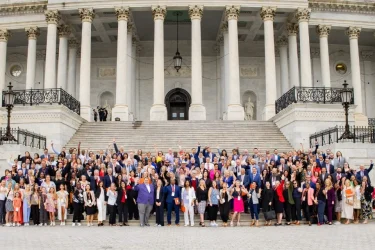
We made significant strides in advancing policies to improve access to care in communities across the country. Most notably, we helped secure the passage of legislation that permanently integrates Certified Community Behavioral Health Clinics (CCBHCs) into Medicaid. We also worked closely with lawmakers on critical legislative initiatives to address the workforce and substance use crises in America — including the Ensuring Excellence in Mental Health Act, the PEERS in Medicare Act and reauthorization of the SUPPORT Act — and we endorsed dozens of key federal and state actions throughout the year.
To support these efforts, we organized workshops, briefings and coalition initiatives, while engaging policymakers through testimony, letters and strategic advocacy. Our advocacy took center stage at our first in-person Hill Day in five years, where 300 advocates from 40 states gathered in Washington, D.C., to champion critical legislation — resulting in 75 new co-sponsors for essential bills. On the state level, we supported initiatives like California’s youth behavioral health training requirements and Colorado’s behavioral health first aid program.
Supporting CCBHC Growth Nationwide
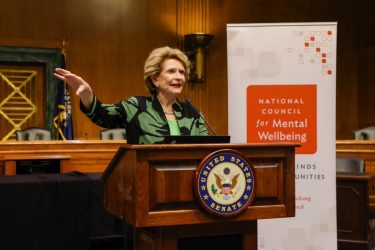
We played a major role in advancing CCBHCs, most notably through the passage of the Consolidated Appropriations Act, which permanently integrated CCBHCs into Medicaid. This landmark legislation established CCBHCs as a defined entity in federal law for the first time, creating a specific mental health and substance use care benefit. We also supported the expansion of the CCBHC Medicaid Demonstration program, welcoming 10 new states into the initiative and expanding access to critical services.
In addition to our legislative achievements, we advocated for CCBHCs by working with policymakers to ensure the model’s sustainability. We secured $385 million in grant funding for CCBHCs; developed key resources, including a 2024 CCBHC Impact Report and training materials; and partnered with the Substance Abuse and Mental Health Services Administration (SAMHSA) to launch a CCBHC State Technical Assistance Center, which helps states implement and advance the model, improving access to care.
Explore this year’s resources to learn more about our work:
- 2024 CCBHC Impact Report
- CCBHCs: A Vision for the Future
- CCBHC Care Coordination Toolkit
- CCBHC Community Needs Assessment Toolkit
- CCBHC Contracting and Community Partnerships Toolkit for Expansion Grantees
- CCBHC State Technical Assistance Center
- Developing Your Value Proposition: A Guide for CCBHCs
- Guide to the CCBHC-Expansion Grantee National Training and Technical Assistance Center
- Resource Guide for Implementing Evidence-based Practices: A Practical Guide for CCBHCs
- The Role of CCBHCs in Crisis Services and Systems
Investing in the Workforce Through Education
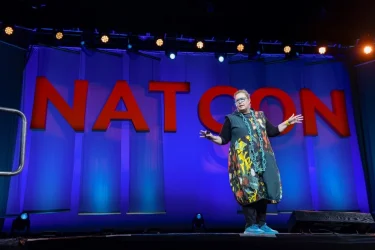
We continued investing in the workforce through education and trainings ― from launching the High Performance Leadership Academy to developing The Center for Workforce Solutions — to help providers strengthen and expand their teams. We also helped bring the National Mental Health Workforce Acceleration Collaborative to three new states, continued advancing the CDC’s Building Capacity Through Community Behavioral Health Organizations to Prevent Overdose initiative and saw the first cohort complete our Workforce ECHO program.
At NatCon24, we showcased our commitment to higher education by bringing nearly 6,000 health care professionals — a new conference record — to St. Louis for three days of expert-led learning. We also launched virtual learning opportunities throughout the year, including the CARE (Cancer, Acceptance, Resilience, Empowerment) ECHO Series for specialized care, the Strengthening Integrated Care for Rural Youth ECHO and the Workforce Solutions Jam webinar series. Other resources we introduced include an online Crisis Services Learning Community to promote collaboration and a Crisis Response Hub.
Explore this year’s resources to learn more about our work:
- 2023 Annual Member Insights Report
- Advancing Measurement-informed Care in Community Behavioral Health
- Center for Workforce Solutions’ Crosswalk Summary
- High Performance Leadership Academy
- Motivational Interviewing Tips for Providers
- NatCon24: A Look Back at Our Annual Conference
- Workforce ECHO: Building a Stronger Behavioral Health Workforce
- Workforce Solutions Jam
Strengthening Substance Use Treatment and Care
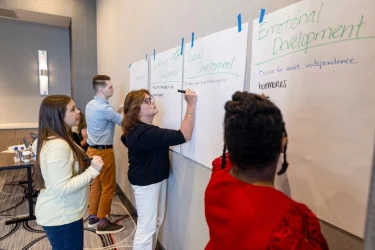
We strengthened our commitment to substance use care by creating a new Substance Use Disorders department, enabling us to expand our role and impact in addressing the quality, effectiveness, accessibility and affordability of substance use programs and services. We also developed resources to help communities drive meaningful change, including a Youth Health Hub, naloxone overdose-reversal training video and a series of briefs clarifying relapse.
From a collaboration standpoint, we worked with the CDC, Ad Council and Shatterproof to share essential knowledge and strategies through the Start With Hope campaign. And at the state level, we collaborated with California health organizations to train nonmedical personnel in effectively addressing critical substance use challenges, among other efforts in communities across the country.
Explore this year’s resources to learn more about our work:
- Demystifying Relapse Issue Brief Series
- Key Language Principles for Substance Use Disorder
- Lowering Overdose Deaths: A Naloxone How-to Guide
- Meaningful Representation of Lived and Living Experience in CCBHC Governance
- Peer Partnerships Organizational Self-assessment Tool
- Protecting Individuals with Lived Experience in Public Disclosure: Lived Experience Safeguard Guide and Scale
- Won’t You Be My Tobacco-free Neighbor? Implementing Tobacco-free Policies That Go Beyond Your Front Door
Increasing Mental Health Literacy in Communities
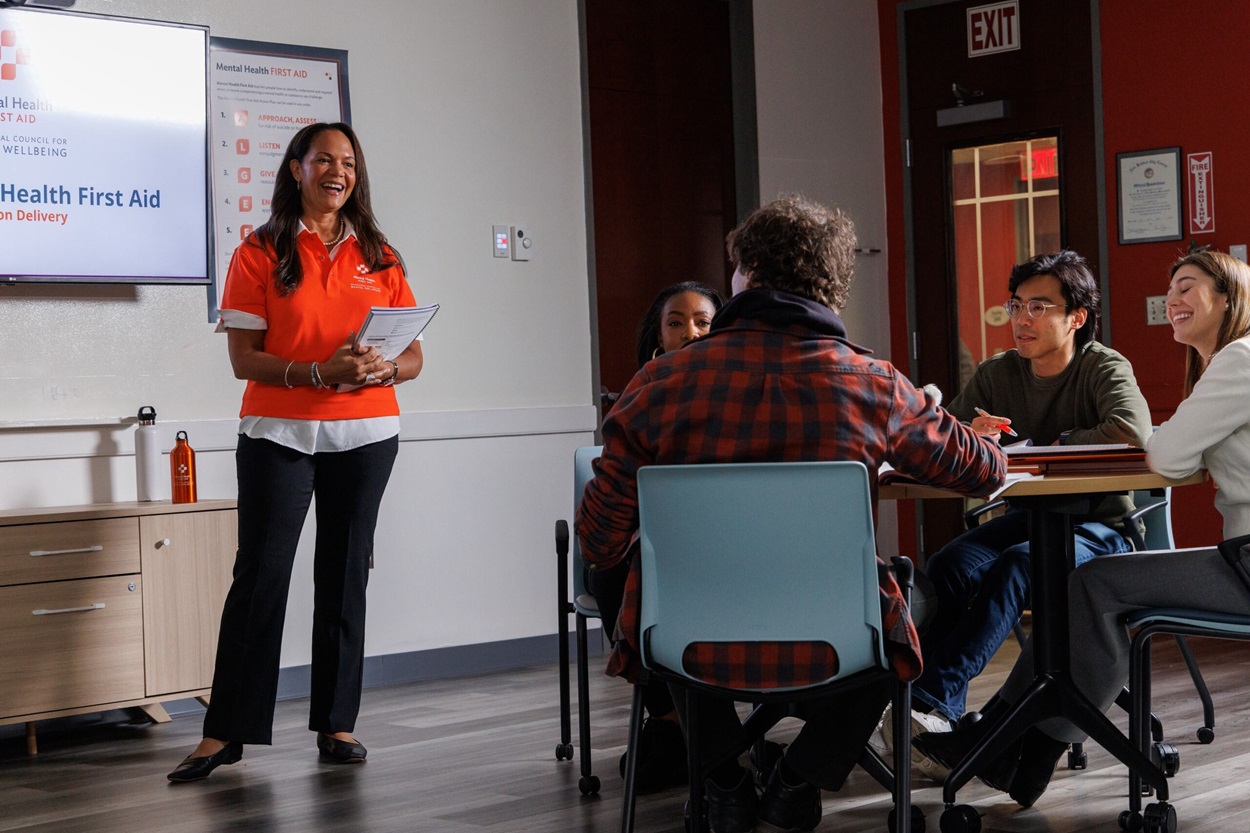
We advanced mental health literacy through our Mental Health First Aid (MHFA) program, reaching a milestone of more than 4 million people trained in the U.S. We also launched a new MHFA at Work product suite, providing organizations with tools and training to build inclusive and mentally healthy workplaces. On the partnership front, we strengthened support for youth mental wellbeing through Harry’s Team: Changing Minds initiative, contributing to the launch of a resource-rich website. We also secured a $1 million grant from the Tepper Foundation to develop sustainable Youth MHFA and teen MHFA toolkits for K-12 schools and youth-serving organizations.
Explore this year’s resources to learn more about our work:
2023/2024 Financials
View our 2023/2024 Consolidated Statement of Financial Position and Consolidated Statement of Activities.
Our Appreciation
We are grateful to our board of directors for their guidance and leadership throughout the year. A special thanks as well to our valued National Council Partners for their unwavering support!
